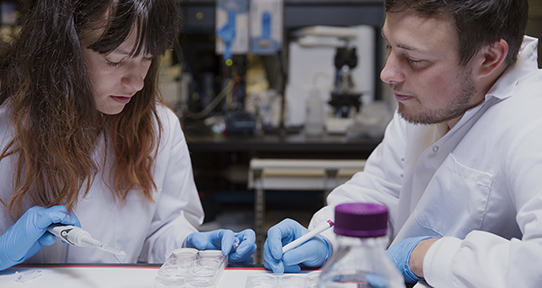Program information

Established in 2011, the goal of the University of Victoria’s research-based Neuroscience Graduate Program (NGP), which offers both MSc and PhD degree programs, is to produce well-trained and fundamentally sound neuroscientists within a multi-disciplinary environment which fosters crosstalk and collaboration.
The program draws top-tier graduate students from Canada, and abroad, who thrive both academically and scholarly in the form of awards, scholarships and scientific publications. The majority of graduates have achieved excellent career outcomes in the Health and Higher Education sectors.
The MSc program is a research degree that typically requires two years of full time study though may take additional time. The Faculty of Graduate Studies (FGS) stipulates that the maximum allotted time for the MSc degree is five years and requires a minimum enrollment of at least 12 consecutive months. In order to extend the graduate program beyond five years, there must be a good rationale for doing so and a formal extension request must be completed.
The minimum stipend ($24,000) is guaranteed for two years however, financial support beyond this time depends on the ability of your supervisor to support you and/or on existing scholarships and awards. You should discuss this topic with your supervisor upon entry into the program and following completion of your first year of studies. Agreement of financial support beyond two years should be confirmed in writing and signed by both your supervisor and you at least three months before the beginning of the third (and subsequent) years. The document should indicate the annual stipend and the term for which this stipend will be provided.
Please refer to the Neuroscience Graduate Program Handbook for detailed information.
The PhD program is a research degree that typically requires four years of full-time study. You may enter the PhD program directly subject to the decision of the Neuroscience Graduate Program Committee (NGC) if they have already obtained a MSc degree from a recognized university or have significant prior research experience such as a Bachelor’s program with Honour’s. You may also enter the PhD program following completion of between 10 and 18 months of study in the MSc program.
The Faculty of Graduate Studies (FGS) stipulates that the maximum allotted time for the PhD degree is seven years and requires a minimum enrollment for at least 24 consecutive months. In order to extend the graduate program beyond seven years, there must be a good rationale for doing so and a formal extension request must be completed.
The candidacy examination must be held within 21 months of a student entering the PhD program. Students transferring from the MSc to the PhD program must complete the exam with 18 months from their entry into the PhD. An extension beyond these limits may be considered provided sufficient rationale.
The minimum stipend ($24,000) is guaranteed for four years however financial support beyond this time depends on the ability of your supervisor to support you and/or on pre-existing scholarships and awards. You are encouraged to discuss this topic with their supervisor upon entry into the program and following completion of their first year of studies. Agreement of financial support beyond four years should be confirmed in writing and signed by both your supervisor and you. The document should indicate the annual stipend and the term(s) for which this stipend will be provided.
Please refer to the Neuroscience Graduate Program Handbook for detailed information.
Innovative research
You'll study among world-class neuroscience researchers working in a vibrant research community.
Cutting-edge technology
Do neuroscience research in our well-funded and equipped modern research laboratories.
Learning environment
At UVic we're promoting scholarship and innovation in medical education and neuroscience research. Take advantage of our low student to teacher ratio, fantastic learning opportunities, and the latest technologies in teaching.
Career options
Experience exciting training opportunities for careers in research, medicine, dentistry, forensics or social services.
Location
Study in one of Canada's most liveable cities with year-round recreation at your doorstep.
Important dates
See the University Graduate Calendar for a list of important dates for the year.
For questions regarding program information contact the Graduate Program and Director's Assistant: ksebastian@uvic.ca.
